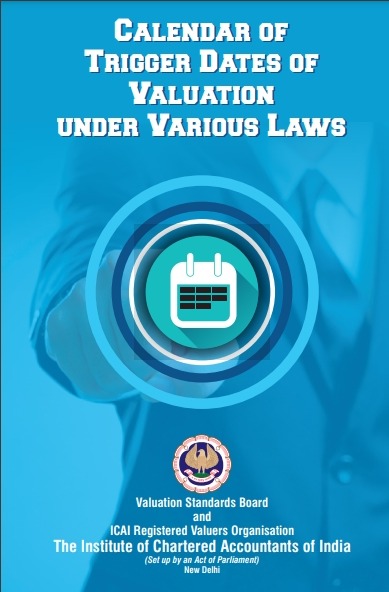Calendar of Trigger dates of Valuation under the various Laws
Introduction
Valuation is an integral part for evaluation of performance of business process. For so many decades, various Laws and Statutes like The Companies Act 2013, The Income Tax Act 1961, the Foreign Exchange Management Act (FEMA) 1999,
The SEBI Act 1992, The Insolvency and Bankruptcy Code, 2016 (IBC) etc., require valuation to be undertaken for diverse purposes. Laws and statutes not only prescribe the varied purpose of valuation but also the valuation methodology, valuation date, event triggering the need of valuation and time for valuation and also who can render the valuation service varies between these laws.
For example, in case of the issue of sweat equity shares /ESOPs, valuation is required at different events under the various laws, the Companies Act requires valuation before the approval of issue of sweat equity shares while under the Income Tax Act same is required at the time of exercise of options and for accounting under Ind AS one needs to get the valuation done at the time of grant of the option and also at the period end in case the ESOP is issued along with a performance criteria that impacts the option price.
The Companies (Registered Valuers and Valuation) Rules, 2017 (Valuation Rules) issued under the Companies Act, 2013, for the first time provided for an institutional framework for development and regulation of the valuation profession, though it is limited to valuations required under the Companies Act, 2013 and the Insolvency and Bankruptcy Code 2016.
Further, the Institute of Chartered Accountants of India issued the ICAI Valuation Standards 2018 for the Asset Class “Securities or Financial Assets” in the year 2018 after recognising the need to have the consistent, uniform and transparent valuation approach and to harmonise the diverse practices in use in India. The objective of issuing the Valuation Standards was to standardise the various principles, practices and procedures followed by registered valuers and other valuation professionals in valuation of assets, liabilities or a business. The ICAI Valuation Standards 2018 sets
out concepts, principles, practices and procedures which are generally accepted internationally having regard to the prevailing legal framework, procedures and practices in India.
However, the ICAI Valuation Standards 2018 clearly lay down that though efforts have been made to ensure that the Valuation Standards are in conformity with the provisions of the applicable laws, customs and usages in India but in case of deviations, the provisions of the law will prevail, and the valuation report should be prepared in conformity with such law. The Valuation Standards by their very nature cannot and do not override the local regulations which govern the preparation of valuation report in the country.
Hence it is imperative for a valuer to not only understand the need for Valuation under various laws and statutes but shall also have knowledge about the varied Valuation methodologies prescribed therein and also the events that triggers the need for valuation under various laws. The trigger points under these laws and statutes, in turn, impact the Valuation Date that shall be considered by a valuer for that particular Valuation Assignment.
ICAI Valuation Standards 2018 defines Valuation date as under: –
“Valuation date is the specific date at which the valuer estimates the value of the underlying asset.”
It further lays down that the valuation date will determine what information can be considered in a valuation. Usually, information that is not available at the valuation date is not considered for the purpose of valuation.
This booklet “Calendar of Trigger Dates of Valuation under Various Laws” is a compilation of valuation needs under the six major laws and statutes applicable in India and aims to provide guidance to the registered valuers and valuation professionals about the valuation trigger points and valuation dates to be considered for various activities and transactions under these. The laws and statutes covered in this booklet are as under:-
(i) The Companies Act 2013;
(ii) The Insolvency and Bankruptcy Code, 2016 (IBC);
(iii) Indian Accounting Standards (Ind AS);
(iv) The Income Tax Act 1961;
(v) Foreign Exchange Management Act (FEMA); and
(vi) Securities and Exchange Board of India (SEBI) Regulations
Read More on ICAI

